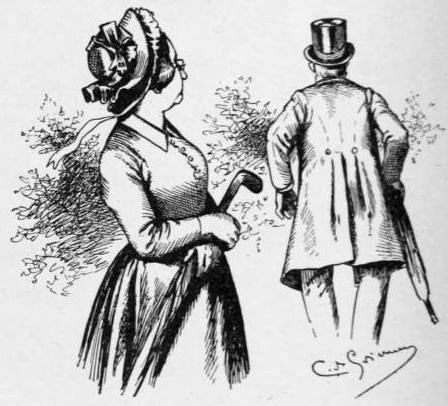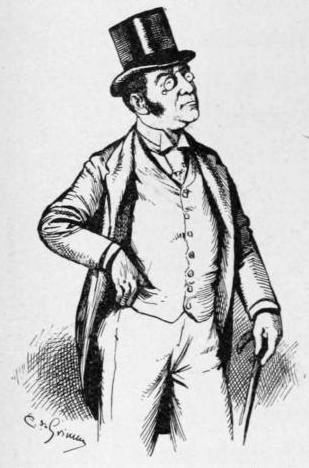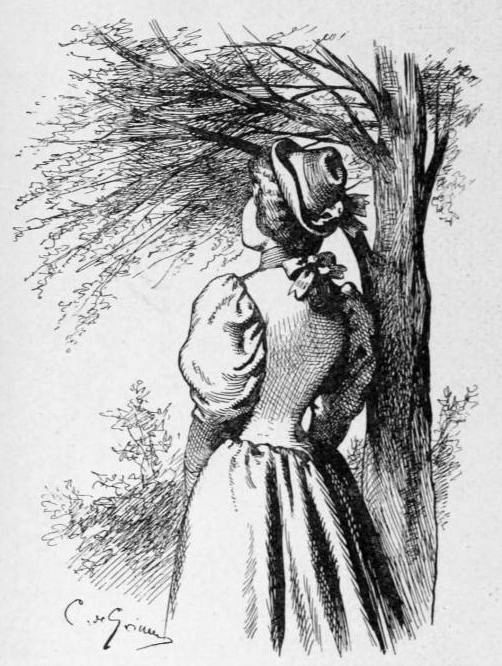CHAPTER XIX.
THE LAKE DISTRICT AND ITS POETS.
We went to Windermere, and from there took the omnibus for Bowness—
One of the charmin’est little villages I ever sot my eyes on, as clean as my kitchen is when I git it all swept out. The housen are all built of stun, and some on ’em have little porches built out on ’em, but all on ’em overrun with ivy. And flowers and pretty climbin’ plants make every house attractive, and not a mite of dust or dirt—I wonder what they do with it?
The little tarvern where we stayed wuz so clean and comfortable that I wondered what the tarvern-keeper and his wife would say if they wuz sot down in some of our own small hotels. It wuz a lesson in perfect neatness and order, the hull place wuz.
And the landscapes all round the little village wuz pretty enough to frame, and we see ’em more or less all the while we stayed there; we made our headquarters there, and sallied out for excursions, a-lookin’ on picters on every side on us—green grass and foliage, high, tree-covered hills, little, lovely, clean, picturesque villages like them I have described, magnificent country seats, with grand entrances and porters’ lodges, and stately green parks, and fountains, and deers, and sleek herds of cattle walkin’ through on the velvet grass and green tree aisles, and cottages, and quaint old bridges, and dark stun churches half covered with ivy.
Bowness is on the shores of the lake. As I say, we put up at a good tarvern, and the next day we sot out on our sight-seein’.
The waiter at the tarvern told us as we sot out on our first excursion that we had better take our waterproofs and umbrells.
It is needless to say that I had my faithful umbrell in my hand, but the rest hadn’t, so they got theirn, and I went back for my waterproof, and glad enough we wuz, for before night we wuz ketched out in four different showers—good drivin’ ones, but short.
Martin, who had been ust to fur bigger lakes—Michigan, Ontario, Superior, and sech—wuz bitterly dissapinted in ’em, and sez he—
“A trout out of Lake Superior would die of thirst in one of these lakes.”
And Josiah, who had been up on our lakes on a tower, sed that those lakes would make a pretty good waterin’ trough for American cattle; sez he, “There would be in each one of ’em as much as an ordinary Yankee cow would want to drink.”
I see the driver a-lookin’ on in deep surprise, and sez I, “Josiah Allen, remember you are a deacon; let it be known to once that you are talkin’ in parables.”
“Wall,” sez he, “I would want to be took in that way, but they’re dum small potatoes compared to our lakes.”
“But they’re beautiful,” sez I, “and are full of tender associations.” Sez I, “Look at the poets that have hallowed these sacred spots—Coleridge, and Southey, and Wordsworth, and Mrs. Hemans, and—”
“Wall,” sez Josiah, interruptin’ me, “on our lakes there is me, and—”
But I turned away in silent scorn, and looked out on the beauty of the seen. Lovely picters lay round us on every side—wooded shores, lovely islands, glowin’ waters—a paneramy of beauty never to be forgot.
Dove’s Nest, which wuz once the home of Mrs. Hemans, I looked on with a deep interest, for though Felishy and I didn’t think alike about little Casey Bianky, who “stood on the burnin’ deck,” and I should have approved of his runnin’ away before he got burnt up, still I respected her for quite a number of things, and as I meditated on the poets who had loved this beautiful place, and lived here and wrote their songs, I instinctively thought, in the words of Felishy—
“Where are these dreamers now?”
The biggest of these lakes are Windermere, Ullswater, Conoston and Durwentwater, but there are a good many others. And they are all, like our Niagara Falls and Thousand Islands, been turned into money-makin’ shows.
Wall, of course we wanted to see—
“How the waters come down to Lodore.”
But we wuz dretful dissapinted, for the water didn’t come a-sweepin’ down with the force and fury Mr. Southey described—not at all. Josiah, who had hearn Thomas J. read the poem, wuz mad to think it wuzn’t so. “And,” sez he, in a threatenin’ way—
“I could tell Mr. Southey that we didn’t know none the better for his tellin’ ‘How the waters come down to Lodore.’
“Why,” sez he, “the mill-dam to our buzz-saw mill in Jonesville is furious agin as this, and more noble and impressin’ lookin’ by fur, and,” sez he, gettin’ all het up, “I’d love to tell Mr. Southey so.”
Sez I, “Josiah, don’t git nerved up and talk about jawin’ a man who has been dead for more’n fifty years.” Sez I, “It don’t sound decent in you—he meant well.”
Sez I, “He wuz good to his own family, and then think of how dretful good he wuz to Coleridge’s wife and children; though, to be sure,” sez I, “they wuz relations on Her side.”
“I understand that,” sez Josiah; “he could do that and not deserve any particular thanks to himself. I know how that is.”
I see he wuz insinuatin’ sunthin’ or ruther, but I wuzn’t browbeat, nor wuzn’t led off by him. Sez I—
“He writ first-rate prose, and wuz Poet Lauerate.
“That wuz what might be expected,” sez Josiah.
I don’t exactly know what he did mean by that, and I don’t believe he did.
“Then,” sez I, “he wuz the greatest talker that ever talked. He would talk for hours and hours, without gittin’ up, or those gittin’ up that heard him.”
“I know what that is,” sez Josiah; “that don’t raise him in my estimation; no, Heaven knows it don’t!”
I hain’t the least idee what he meant by that, but he found immegiately that I wouldn’t multiply any more words with him.
But, as I sez, it wuz a comfort to visit this hant of Southey, and I wuzn’t goin’ to see him run down too much for enlargin’ a little mite about the power of that waterfall; as I sez to Josiah—
“Sunthin’ ort to be allowed for a poet’s license.”
“Oh, yes, that is so; I didn’t think of it,” sez he. “I thought it wuz a barefaced lie. I see,” sez he; “I make use of one of them poet’s licenses myself sometimes; I forgot.”
Wall, the waters did meander down in a very languishin’ and thin sort of a way, and I couldn’t deny it, but the surroundin’s wuz beautiful and the associations hantin’ and powerful in the extreme.
Wall, while we wuz in that neighborhood I see everything I could of the remains of the Lake School of Poets. I told Josiah I wanted to, and he sez—
“Wall, I d’no as I’m a-goin’ to make much of a effort to see their hants.” Sez he, “Probble they got that name, Lake Poet, because their poetry hain’t no bigger accordin’ than the lakes be, and if that is so, I don’t want to patronize ’em.”
“Patronize!” sez I, lookin’ several icy cold daggers through him. “I have to stand Martin’s demeanors and acts, though they are harrowin’ to my soul and sickenin’ to the stumick, but I won’t stand by and have my own pardner talk about patronizin’ Coleridge and Wordsworth.” Sez I, “Talk about patronizin’ the man that wrote ‘The Ancient Mariner.’”

MY TONE CHILLED HIM TO THE VEINS.
My tone chilled him to the veins, and he walked off some distance away. And my mind roamed on that weird and matchless poem I had heard Thomas J. read so much, that I wuz as familiar with as I wuz with the Almanac.
How the Ancient Mariner—
“Held the wedding guests with his glittering eye.”
And how that belated guest “beat his breast” as he heard the weddin’ guests pass in, and he havin’ to set out on a stun by the side of the road, and had to hear this “gray beard loon” tell his story. For the old Mariner knew the one he had to tell it to when the fit come on, and so that weddin’ guest had to set and hear that most weird and wonderful story ever told.
And at last, jest as he released that poor, tuckered-out guest (when the weddin’ wuz all over, poor dissapinted creeter!), how he ended with these lines, so noble they must have mollified that poor, belated creeter—
“He prayeth best, who loveth best
All things, both great and small,
For the dear God, who loveth us,
He made and loveth all.”
And then there is the poem of Christabel, another one of my very primest favorites. How many times the truth of some of them lines have been brung up to me in my own native land of Jonesville!
“Alas! they had been friends in youth,
But whispering tongues can poison truth.”
Alas! for the whisperin’ tongues that carry the poison of asps with them. Alas! for the hearts and lives that through their malice and whisperin’s are torn apart, and nothin’ can atone for their evil effects—nothin’, nothin’
“Can free the hollow hearts from paining,
They stand aloof, the stars remaining.
Like cliffs that have been rent asunder,
A dreary sea now flows between.”
Yes; my mind jest dwelt on Mr. Coleridge all the time while I wuz in the Lake Deestrict. But we see while we wuz there lots of other places of great interest to me. Though, as I sed, the Falls of Lodore didn’t fall quite so much as he had depictered ’em, yet Rydal Falls wuz a seen of beauty and enchantment, with the water flowin’ down through the rocks and overhangin’ trees. It wuz a picter to always remember, to frame round with admiration and hang up in your memory.
And then there wuz a promontory called Storr’s Point, which had a observatory built on it. Here wuz where Sir Walter Scott, Wordsworth, Southey, and Conway met in 1825 to see a regatta gin in Scott’s honor.
It must have been a pretty sight, the scenery around it wuz so beautiful.
And then we see Miss Martineau’s handsome residence, called the Knolls. I spoze on account of its being built on quite a rise of ground.
I spoze she wuz quite a likely poetess, and wrote most probble twenty books on every subject, from religion and politics to mesmerism and handicraft. But Thomas Jefferson couldn’t never git over sunthin’ she said to Charlotte Brontë in a kind of a fault-findin’ way; it jest gaulded Charlotte dretfully. Poor little creeter! with the mind of a giant and the body of a child—a glowin’ soul of fire and the shrinkin’ weakness and tenderness of heart of a young child.
Harriet hadn’t ort to said it—she ort to known that God don’t send a genius any too often onto this dull earth, and folks ort to prize ’em and guard ’em when He duz; but folks don’t; they pick at ’em, and they have to stan’ it, and build up a stun wall of endurance and constant anguish of patience between these tormentors and their own souls and sensitive feelin’s. And then set behind that barricade and try to write. And folks only see the stun work, and don’t see what it wuz raised for, and they call ’em cold, and cross, and unfeelin’, and etc., etc., etc.
But they hain’t cold, nor etc., etc., etc.—no sech thing.
But I am a-eppisodin’, and to resoom.
I presoom that one thing that made Harriet sour and kinder hard sometimes wuz she wuz so deef; not a-knowin’ any of the time what other wimmen wuz a-sayin’ about her—behind her back, or to her face either; it’s enough to sour any disposition, only the very sweetest ones.
Wall, we went to Hawkeshead, where Wordsworth went to school, Martin sayin’ he should probble be asked if he had seen the old school-house.
It wuz a old schoolhouse a hundred years ago, when Wordsworth went to school there.
It is a little, old-fashioned place, and Martin put his fingers in his vest pockets, and leaned back, and looked round him some as if he wuz a-patronizin’ them old memories with which the place wuz filled.
Good land! he’d no need to; them memories towered up and filled the hull place, and floated off round it into the serene, beautiful English landscape, and up towards the blue heavens above.

MARTIN WITH HIS PATRONIZIN’ WAYS.
Martin couldn’t quell ’em down with his leanin’s back, and thumbs in his armholes, and patronizin’ ways.
I sot down to the poor, shabby old bench to which he had sot, and see the very spot where the boy Billy had cut his name in the rough old desk. Mebby he got licked for it—I shouldn’t wonder a mite. The teacher not knowin’ that though he might be slapped in youth, and laughed at by Reviewers in early manhood, yet a great man—a man of simple manners, and a soul of genius sot there at that desk, jest as the great oak wuz hid in the heart of the acorn in Billy’s pocket, mebby, at the time.
I had quite a large number of emotions as I sot there—probble upwards of seventy-five.
Wall, of course we went to Rydal Mount, the home where he lived and worked, and to Grass-mere, where he lays asleep with his kindred.
The south wind waved the branches of the trees that stood jest a little ways from the simple slabs.
Not fur off wuz the grave of Hartley Coleridge, son of Wordsworth’s friend—a son who inherited all the splendor and weakness of his father’s nater.
He drinked!
But some of his sonnets are upliftin’ in the extreme.
“Poor creeter! what he could have been if he had left stimulants alone,” I sez to my pardner, as we looked down on his quiet grave.
And he sez, “There you be agin—meetin’-housen and castles can’t stop you, nor buryin’-grounds skair you out; I’m sick of your dum W. C. T. U. talk!”
I felt too riz up to argy with him, but I felt deeply the truth of what whiskey had done in his case. And as to his pa, I said to myself, “Weakness of will, and opium, mebby, stood in the way of the world’s seein’ another Shakespeare—not jest like him, but a new and uneek type of poet; jest as great and dazzlin’, but different as one big star differs from another—all on ’em a-flashin’ out light onto a dark, dull world.
Alice felt deeply the sweet sadness of the spot—the quiet beauty of the landscape round us, the bird’s song in the green branches overhead, and the low, sweet song of the little stream, the south wind amongst the trees.
She stood under a tree lookin’ up through it into the sky overhead, followin’ the flight of a bird. Her face looked so sweet—so sweet that I thought if Wordsworth was here he would be reminded of his own lines, and think that—
“Beauty born of murmuring sound
Had passed into her face.”
Her face had a good look to it, too, that made me think that she wuz a-goin’ to make—
“A perfect woman, nobly planned,
To warn, to comfort and command,
And yet a spirit still and bright,
With something of an angel’s light.”
Al Faizi felt this, I see—I could see that by his face. But I knew, havin’ seen her tired out and kinder fraxious when her shoes hurt her feet or a hairpin pierced her, or her cosset pinched her, etc., I knew she wuz a creeter—
“Not too bright or good
For human nature’s daily food,
For transient sorrows, simple wiles,
Praise, blame, love, kisses, tears and smiles.”
But he see her only as a “lovely apparition,” a “phantom of delight.”
I felt that as he stood there in that rapt moment he see all the beauty of nater through her—he see rock and plain, earth and Heaven, glade and bower. I methought he wuz sayin’ to himself as he looked at her—
“The floating clouds their state shall lend
To her; for her the willow bend;
Nor shall she fail to see,
Even in the motions of the storm,
Grace that shall mould the maiden’s form
By silent sympathy.
“The stars of midnight shall be dear
To her; and she shall lean her ear
In many a secret place,
When rivulets dance their wayward round,
And beauty, born of murmuring sound,
Shall pass into her face.”

A LIVIN’ POEM BOUND UP IN A GIRL’S SWEET BODY.
And I felt, too, in view of what I knew, that all that would be left of Al Faizi in the futer would be the memory of what had been and never more would be. Yes, all took up as he wuz with the poets of the western world, he wuz more heart interested in the livin’ poem bound up in a girl’s sweet body. And he turned away from the hants of poets to look in her sweet face.
Poor creeter! I see what he didn’t spoze I did, and all the rest wuz deef and dum—deef as posts and dum as adders.
But I am a-eppisodin’ and to resoom.
We sot out for London the next day.






